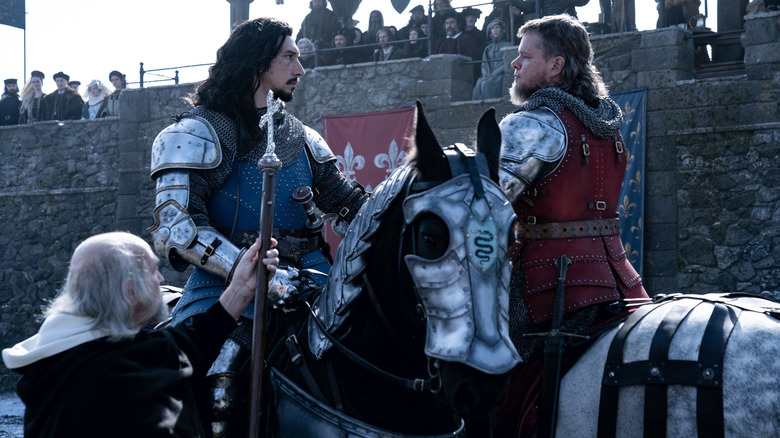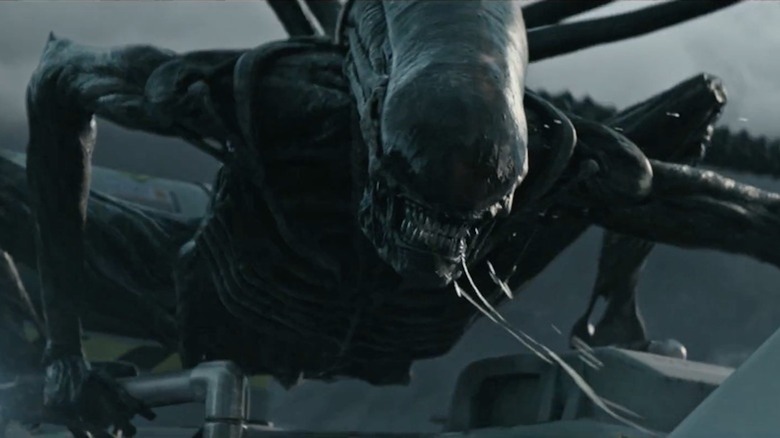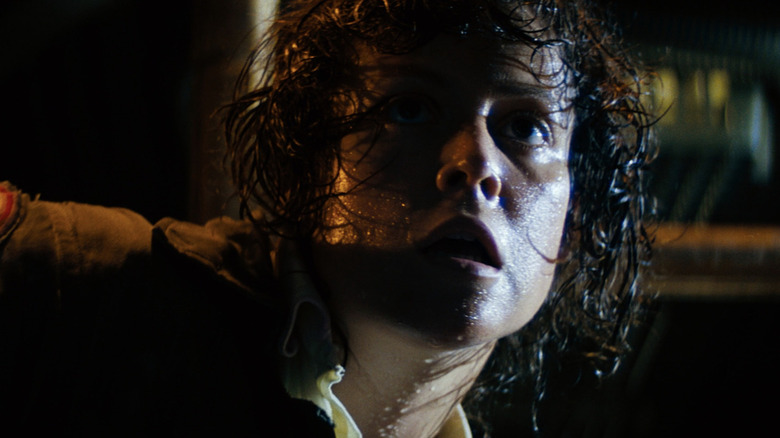Ridley Scott Believes This Is The Most Important Thing When It Comes To Directing
Ridley Scott didn't make his first feature until he was 40, but the now 85-year-old filmmaker has more than made up for lost time. He's currently shooting his 28th movie, "Napoleon," and has a development slate full of projects angling to be number 29. Stanley Kubrick could only muster 13 films over roughly the same period of time (a chunk of which was dedicated to an unmade Napoleon biopic), but his relentless perfectionism spared him the undercooked likes of "Someone to Watch Over Me" and "A Good Year."
Even when Scott (rarely) misses, there's still much to savor in terms of craft. When it comes to packing the frame with visual stimuli, he has few equals (e.g. Spielberg, Scorsese, and Martel) and no superiors. Be it widescreen or flat, every frame is a marvel. His commercial-directing background clearly taught him the value of vividness. From the chestburster splattering blood all over the Nostromo's sterile white dining quarters in "Alien" to Jean desperately driving his dagger down Jacques' gasping maw in "The Last Duel," Scott's images leave an indelible imprint.
How does he keep performing at such a level when most people are retired or, you know, dead?
Ridley Scott and the Boy Scouts want you to be prepared
In an interview with The Guardian prior to the release of his hugely underrated "Alien: Covenant," Scott emphasized planning and decisiveness:
"It's fatal to turn up on set and say, 'What are we going to do?' Fatal to discuss where the cameras are going to go. You cannot do that. That's where it comes unhinged."
This preparedness, which allows Scott to bring his decidedly inexpensive films on time and under budget, has likely kept him out of director jail:
"A film like 'Alien: Covenant' would normally be 100 days; we did it in 74. We made it for $111 million, as opposed to $180 million or $260 million. It's insane the amount of money spent. When you're spending $250 million on a movie, you should have been fired a year ago."
Scott likens his creative process to that of a painter:
"You walk in the room in the morning, where you spent all day yesterday by yourself. You stare at the canvas and you go: 'Bloody hell, I hate it.' Painting is all about what you did yesterday, how you're going to recorrect it, improve it, or go: 'Holy s***, I got it.'"
This isn't the creative paralysis of preciousness, but rather the cold, hard practice of being your harshest critic. At Scott's age, you only get here and stay here if you surround yourself with collaborators who aren't afraid to challenge you. Scott may not lack for self-confidence, but he doesn't get high on the scent of his own flatulence. He holds himself accountable.
Killing the right darlings
You could argue that Scott has survived box office failures that would've ended most people's careers (most notably "Blade Runner"), but good luck finding the filmmaker with the innate visual talent to put those images on the screen. Scott is the painter who ever looks forward, which can be dangerous, too. When given the opportunity to revisit "Alien," he "streamlined" the film, thus robbing the classic of its delectable slow build and killing the suspense of several unforgettable set pieces, like Brett's fatal attempt to lure Jonesy the cat out of hiding. There's also the time he buckled under studio pressure and cut 50 minutes out of his masterful "Kingdom of Heaven." That was a mistake.
Most filmmakers will never be in a position to excise an hour from a starless, $130 million Crusades epic. They will, however, always have the opportunity to make the most of a low-budget opportunity. Compromise is inevitable, which is why preparation is key. Follow Ridley Scott's example. The better you know your movie, the more likely you are to kill the right darlings. Just don't go darling-hunting 30 years later, especially if you've made the arguably the greatest sci-fi/horror flick of all time.


